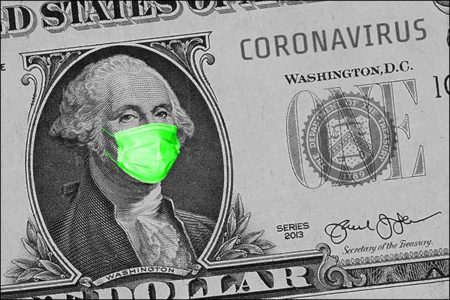
US equity markets had a good third quarter (+8.9%) despite a rough (-3.8%) month of September. July and August were strong, driven primarily by the notion that much of our economy can function even with part of it disabled by a pandemic. Many of the same stocks that drove the market in April, May and June continued their strong performance, though the highest flyers suffered more in September. Volatility was up in September, with 17 of the 21 trading days showing a spread between the daily high and low of greater than 1%; two of those days had a spread in excess of 3 percent.
As the market roared back from the depths of fear in March, a new term entered the lexicon of our financial markets: “Covid stocks.” These stocks are representative of companies that have benefitted from the COVID-19 pandemic. Clear examples include technology companies providing the hardware and software that enable remote work, remote meetings and remote learning. In addition, there are cloud-based services companies that have excelled as their offerings are by definition remote from their users. Furthermore, the Silicon Valley cadre of tech employees is as flexible as the open floor plans their companies have adopted. Working remotely for them is part of their culture and allowed this sector to keep the rest of us capably functioning away from our office settings. Other COVID-19 beneficiaries included retailers labelled as “essential.” Those businesses that were prepared to handle customers in person or online with alternative shipping or pickup options have prospered. Manufacturers of essential products had to adapt to both changing markets and provide employees with a safe work environment.
New Consumer Choices
The COVID-19 pandemic has also had an interesting effect on consumer behavior. With a huge percentage of the US population stuck at home (and working from there), many discretionary purchases were deferred. Spending on travel and leisure activities was nil. Yet, when the market showed some resiliency, consumers with adequate resources felt empowered to spend. Anchored at home, we found our home offices may have been inadequate, and we needed home exercise equipment or perhaps new furniture. When the weather improved, we turned our attention to the outdoors and more Americans took up gardening than ever before. Companies addressing these needs found themselves well positioned.
With COVID-19 making urban life more challenging, city dwellers (particularly millennials) began looking for suburban housing options. This trend accelerated when urban unrest turned violent in June and July. These new, young suburban families need two cars with at least one large enough for four, plus all the gear four people require for a weekend away. Furthermore, people who were accustomed to using ride-sharing services like Uber and Lyft have begun to opt for their own space and greater independence and are purchasing autos too.
Changing Industry Fortunes
As Americans adapted to working remotely and life with social distancing, real estate well beyond suburbia heated up. Other factors influencing this could be an unwillingness to fly to vacation destinations and stay in hotels or other “publicly available options.” Traditional summer communities and more remote mountain, lake and seaside vacation spots experienced strong demand. Inventories of condos and homes for sale dropped to lows of 2.9 months, where 6 months is considered “equilibrium.” Real estate turnover begets home improvement spending. Strengths in housing and autos have typically been signs of a very healthy economy.
Despite the fact that the travel and leisure world is suffering like never before, it makes up only one small segment of our economy. Business travel has been replaced by Zoom video conference calls. Companies are saving on travel expenses, likely offsetting COVID-19-related expenses (sanitation, social distancing, employee physical separation measures) and those that can are offering employees the option to permanently work remotely. Restaurants are another service industry suffering greatly. Even operating at 25-50% of capacity is unlikely sufficient to provide ownership a decent return on their investment. Those who worry about restaurant failures should be reminded that restaurants have always come and gone. The industry is notorious for quick successes and equally fast flameouts. Once the pandemic ends and restaurants can open, new capital will fund the best opportunities and the entrepreneurs will return. It’s what capitalists do in a free society. Meanwhile, the government will have to take care of the wait and kitchen staff who are out of work by providing ample unemployment benefits.
Look Long-term Amid Uncertainty
Investors have been inundated with quite of bit of noise on the health of the economy, the health of consumers, the likelihood and size of another stimulus package, predicting election results and the ongoing pandemic. All these factors impact corporate revenues and profits expectations. We always have conflicting in formation or conflicting interpretations of various sources of data and other information. Election polls, for example, can vary significantly, and we learned in the 2016 presidential election the polls don’t always predict the result accurately. Pollsters don’t want to be incorrect and therefore adjust (presumably) their methodologies to try to better collect and analyze their data to provide a more accurate prediction. However, the uncertainty remains and both opinion and bias impact both the interpretation and the presentation of data.
September’s market reflects this uncertainty. Since the election has apparently been settled, the market has reacted positively. The positive pricing action most likely reflects a hopefulness for more constructive behavior by the political class and the prospects for a balanced government which will be forced to compromise rather than force its economic philosophy on the electorate. Furthermore, we know that despite the current pandemic, the economy will likely come out the other side and be pretty healthy. Long-term investors should be prepared to take advantage of post-election volatility to invest idle cash.
Lawrence S. Foster, Vice President
